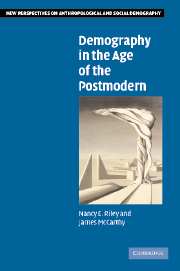Book contents
- Frontmatter
- Contents
- Acknowledgments
- 1 Introduction: why examine demography?
- 2 A brief introduction to postmodernism
- 3 The essentials of demography
- 4 A genealogy of demography
- 5 Demography's place in the social sciences
- 6 Feminist demography
- 7 Postmodern perspectives in demography
- 8 Some final thoughts
- Notes
- References
- Index
7 - Postmodern perspectives in demography
Published online by Cambridge University Press: 05 June 2012
- Frontmatter
- Contents
- Acknowledgments
- 1 Introduction: why examine demography?
- 2 A brief introduction to postmodernism
- 3 The essentials of demography
- 4 A genealogy of demography
- 5 Demography's place in the social sciences
- 6 Feminist demography
- 7 Postmodern perspectives in demography
- 8 Some final thoughts
- Notes
- References
- Index
Summary
Today “strictly demographic” reasoning is so compelling, and its technical fascination so great … that the courage to take up the challenge from the interdisciplinary front is perhaps even more urgently required in order to broaden prospects for progress.
(Saito 1996: 553)A discipline on the alert should move a bit like an amoeba, sending out pseudopodia to envelop and ingest interesting-looking pieces of subject matter.
(McNicoll 1992: 413)In this chapter, we use examples of recent research on population issues to illustrate our arguments of the previous chapters and to demonstrate the usefulness of postmodern perspectives in demographic work. There are, of course, many other research projects and publications we could have used. We have chosen the ones included here because their potential use is particularly clear or because we are most familiar with them. Through our discussions of these pieces of scholarship, we will highlight some of the more important aspects of postmodern perspectives for demography, among them: a move away from a universal perspective and a focus on the local; an “incredulity towards metanarratives” (Lyotard 1996: 482); the blurring of boundaries (especially disciplinary); attention to inequalities and their influences; the role of power and inequality in epistemological focuses; a questioning of positivist and objective perspectives; and an attention to interpretation rather than a primary focus on better or exact measurement.
- Type
- Chapter
- Information
- Demography in the Age of the Postmodern , pp. 120 - 152Publisher: Cambridge University PressPrint publication year: 2003



